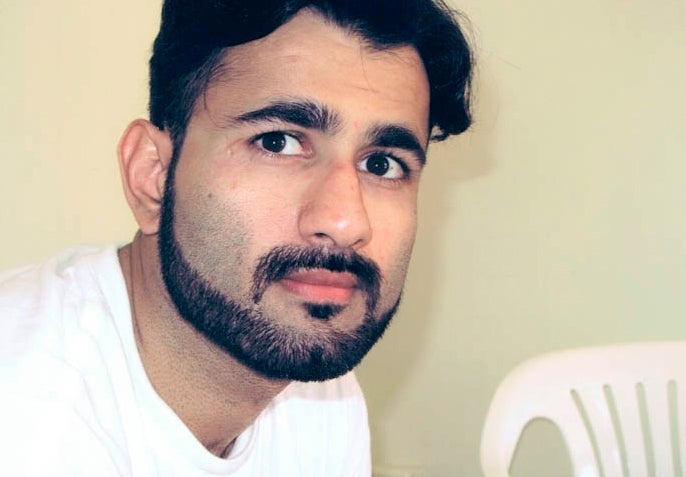Prisoner gives Guantanamo court first account of CIA abuse
A Guantanamo Bay prisoner who went through the brutal U.S. government interrogation program after the 9/11 attacks described it openly for the first time Thursday

Your support helps us to tell the story
From reproductive rights to climate change to Big Tech, The Independent is on the ground when the story is developing. Whether it's investigating the financials of Elon Musk's pro-Trump PAC or producing our latest documentary, 'The A Word', which shines a light on the American women fighting for reproductive rights, we know how important it is to parse out the facts from the messaging.
At such a critical moment in US history, we need reporters on the ground. Your donation allows us to keep sending journalists to speak to both sides of the story.
The Independent is trusted by Americans across the entire political spectrum. And unlike many other quality news outlets, we choose not to lock Americans out of our reporting and analysis with paywalls. We believe quality journalism should be available to everyone, paid for by those who can afford it.
Your support makes all the difference.A Guantanamo Bay prisoner who went through the brutal U.S. government interrogation program after the 9/11 attacks described it openly for the first time Thursday, saying he was left terrified and hallucinating from techniques that the CIA long sought to keep secret.
Majid Khan, a former resident of the Baltimore suburbs who became an al-Qaida courier, told jurors considering his sentence for war crimes how he was subjected to days of painful abuse in the clandestine CIA facilities known as “black sites,” as interrogators pressed him for information.
It was the first time any of the so-called high value detainees held at the U.S. base in Cuba have been able to testify about what the U.S has euphemistically called “enhanced interrogation" but has been widely condemned as torture.
“I thought I was going to die,” he said.
Khan spoke of being suspended naked from a ceiling beam for days at a time, doused repeatedly with ice water to keep him awake for days. He described having his head held under water to the point of near drowning, only to have water poured into his nose and mouth when the interrogators let him up. He was beaten, given forced enemas, sexually assaulted and starved in overseas prisons whose locations were not disclosed.
“I would beg them to stop and swear to them that I didn’t know anything," he said. "If I had intelligence to give I would have given it already but I didn’t have anything to give.”
Khan, reading from a 39-page statement, spoke on the first day in what is expected to be a two-day sentencing hearing at the U.S. base in Cuba.
A panel of military officers selected by a Pentagon legal official known as a convening authority can sentence Khan to between 25 and 40 years in prison, but he will serve far less because of his extensive cooperation with U.S. authorities.
Under a plea deal, which the jurors were not told about, Khan's sentence by the jury will be reduced to no more than 11 years by the convening authority, and he will get credit for his time in custody since his February 2012 guilty plea.
That means he should be released early next year, resettled in a third, as yet unknown country because he can't return to Pakistan.
Some of Khan’s treatment is detailed in a Senate Intelligence Committee report, released in 2014, that accused the CIA of inflicting pain and suffering on al-Qaida prisoners far beyond its legal boundaries and deceiving the nation with narratives of useful interrogations unsubstantiated by its own records.
Khan agreed with that assessment. “The more I cooperated and told them, the more I was tortured," he said.
Khan, 41, has admitted to being a courier for al-Qaida and taking part in the planning of several plots there were never carried out. He pleaded guilty in February 2012 to charges that include conspiracy, murder and providing material support to terrorism in a deal that capped his sentence in exchange for cooperating with authorities in other investigations, including the case against the five men held at Guantanamo who are charged with planning and providing logistical support for the Sept. 11 attack.
A citizen of Pakistan who was born in Saudi Arabia, Khan came to the U.S. with his family in the 1990s and they were granted asylum. He graduated from high school in the Baltimore suburbs and held a technology job in the D.C. area at an office where he could see the smoke billowing from the Pentagon on Sept. 11, 2001.
He says he turned to radical ideology following the death earlier that year of his mother, whom he described as the most important person in his life.
Khan apologized for his actions and said he takes full responsibility. “I have also tried to make up for the bad things I have done,” he said. "That’s why I pleaded guilty and cooperated with the USA government”
Khan is the first of the high-value detainees, those who went through the interrogation program, to be convicted and sentenced at the military tribunals held on the base.
The five men charged in the Sept. 11 attacks include Khalid Shaikh Mohammad, who has portrayed himself as the architect of the plot. That case remains in the pretrial stage and a judge has said it will start no sooner than next year.
The U.S. holds 39 men at the detention center on Naval Station Guantanamo Bay.
——
Editor's note: The Associated Press viewed proceedings from a video feed at Fort Meade, Maryland.